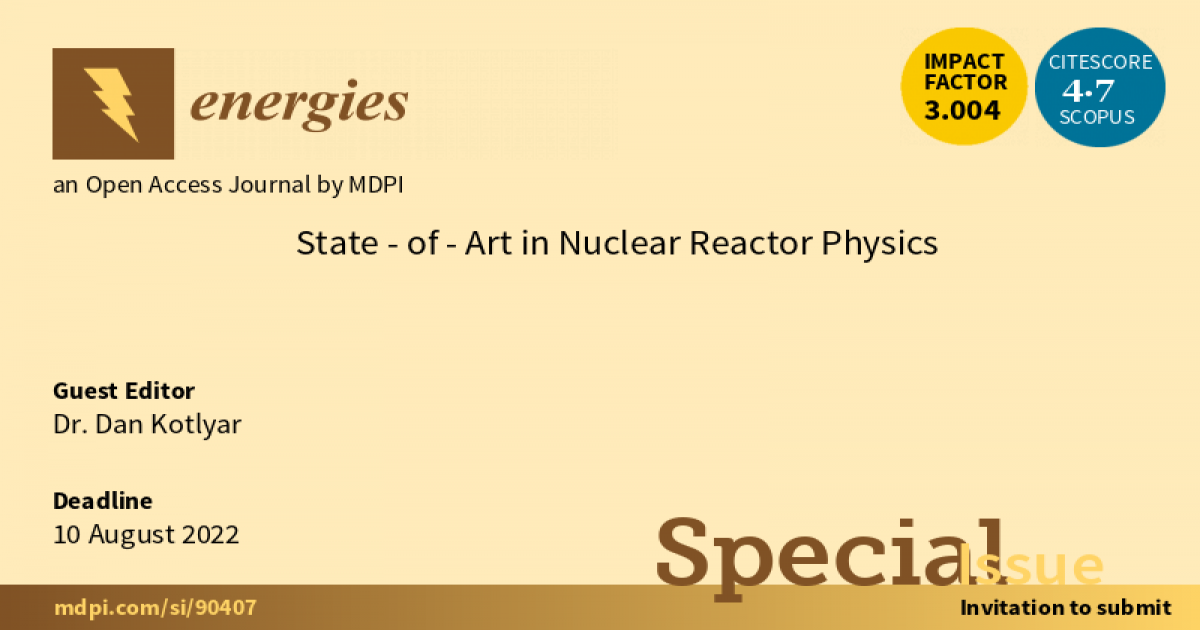- 3.2Impact Factor
- 7.3CiteScore
- 17 daysTime to First Decision
State-of-Art in Nuclear Reactor Physics
This special issue belongs to the section “B4: Nuclear Energy“.
Special Issue Information
Dear Colleagues,
There are many technical challenges relating to the licensing of advanced concepts and promoting new fuel and clad technologies. In addition, the regulatory requirements for safety criteria are constantly evolving. Utilities are also facing various engineering challenges that include spent fuel management, irradiation-induced reactor vessel damage, and many others. Advanced methods and integrated/coupled tools are necessary to understand the operational limits and assess fuel performance, in terms of burnup and thermal hydraulic reliability, and the associated safety margins. High-fidelity computational codes and multiphysics platforms (e.g., Nuclear Energy Advanced Modeling and Simulation (NEAMS)) are of the utmost importance in capturing important physical effects. An example of the latter is hydrogen permeation or loss from hydride moderators, such as zirconium hydride or yttrium hydride, which represents a critical design challenge for hydride-moderated nuclear reactors. This Special Issue of Energies on “State-of-Art in Nuclear Reactor Physics” focuses on new methodologies, techniques, and computational frameworks that are directly applicable to solve various design and licensing problems of modern nuclear reactor fission systems.
Relevant topics include, but are not limited to, the following research topics:
- State-of-the-art spatial kinetics methods;
- Modern nodal diffusion codes;
- The advancement of 2D and 3D deterministic transport methods;
- The use of Monte Carlo methods for full-core solutions;
- Time-dependent Monte Carlo methods;
- The development and/or application of multiphysics frameworks.
Manuscripts addressing any combination of these topics where more than a single aspect of physics is coupled with any of the above options (e.g., coupled Monte Carlo and thermal-hydraulics or coupled nodal diffusion with Monte Carlo) are also welcome.
Dr. Dan Kotlyar
Guest Editor
Manuscript Submission Information
Manuscripts should be submitted online at www.mdpi.com by registering and logging in to this website. Once you are registered, click here to go to the submission form. Manuscripts can be submitted until the deadline. All submissions that pass pre-check are peer-reviewed. Accepted papers will be published continuously in the journal (as soon as accepted) and will be listed together on the special issue website. Research articles, review articles as well as short communications are invited. For planned papers, a title and short abstract (about 250 words) can be sent to the Editorial Office for assessment.
Submitted manuscripts should not have been published previously, nor be under consideration for publication elsewhere (except conference proceedings papers). All manuscripts are thoroughly refereed through a single-blind peer-review process. A guide for authors and other relevant information for submission of manuscripts is available on the Instructions for Authors page. Energies is an international peer-reviewed open access semimonthly journal published by MDPI.
Please visit the Instructions for Authors page before submitting a manuscript. The Article Processing Charge (APC) for publication in this open access journal is 2600 CHF (Swiss Francs). Submitted papers should be well formatted and use good English. Authors may use MDPI's English editing service prior to publication or during author revisions.
Keywords
- Neutron diffusion
- Deterministic transport
- Monte Carlo
- Multiphysics
- Kinetics and dynamics.

Benefits of Publishing in a Special Issue
- Ease of navigation: Grouping papers by topic helps scholars navigate broad scope journals more efficiently.
- Greater discoverability: Special Issues support the reach and impact of scientific research. Articles in Special Issues are more discoverable and cited more frequently.
- Expansion of research network: Special Issues facilitate connections among authors, fostering scientific collaborations.
- External promotion: Articles in Special Issues are often promoted through the journal's social media, increasing their visibility.
- e-Book format: Special Issues with more than 10 articles can be published as dedicated e-books, ensuring wide and rapid dissemination.

